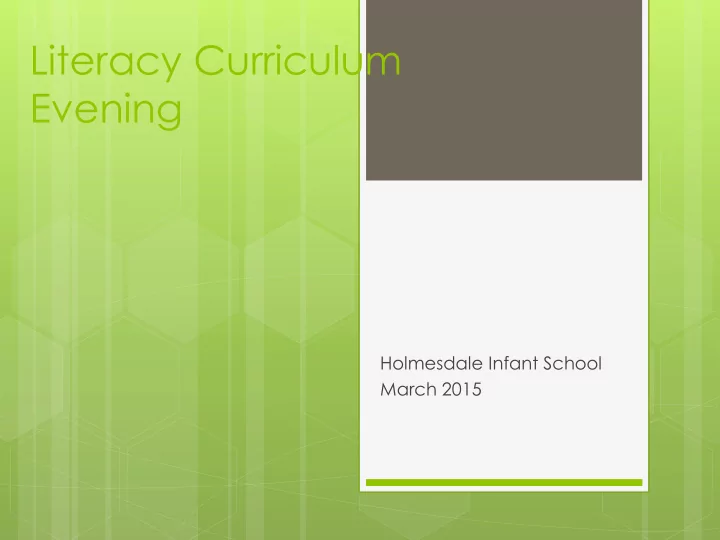

Literacy Curriculum Evening Holmesdale Infant School March 2015
How is Literacy taught? One hour of Literacy every day Weekly 15/20 minute Guided Reading / Reciprocal reading sessions Phonics four times a week / weekly spellings Independent reading Handwriting Speaking and Listening opportunities.
Progression Through Teaching We teach in topics and they fall into these main categories: • Narrative [stories with familiar settings / by the same author / from different cultures] • Poetry • Non-fiction [Information writing / lists / recounts]
How do we start? We start with a stimulus, and this might be: • A book (fiction or non-fiction) • Poem • An excerpt from a film or book • A photograph or painting • A question • Detective work • Real life experience / drama
Getting into it!! • We prepare the children before they write and we will do this by: • Engaging the children in discussions either in groups or pairs. • Collecting words or phrases and turning them sentences. • Doing drama to get the children into a character or a situation. • Starting a list of success criteria
Then what? Now comes the process of reading… Comprehension texts. • Reading a text that will support their • writing (modeling). In guided reading children will read • texts that are similar in genre and will be suited to their ability. Reciprocal reading •
Still with me?
Where is the writing? The writing comes very much at the end. By this point the children are prepared to produce a piece of writing of a high level [they have been taught the elements of that genre and have developed a list of success criteria] They will have learnt new words and phrases; worked on punctuation and sentence structure and studied examples and discussed them.
Where do we find out what to teach? The Literacy framework is the document from which we currently plan and is set by the government. In Sept 2014 this is to be replaced by the new Primary Framework. These are the strands from which we teach from which relate to what I’ve been talking about…
Ready? 12 strands Speaking 1) Listening and responding 2) Group discussion and interaction 3) Drama 4) Word recognition, decoding (reading) and 5) encoding (spelling) Word structure and spelling 6)
There’s more! Understanding and interpreting texts 4) Engaging and responding to texts 5) Creating and shaping texts 6) Text structure and organisation 7) Sentence structure and punctuation 8) Presentation 9)
What about September 2014? These ‘strands’ form the basis of all good Literacy and will still be taught. From Sept 2014 the New Primary Curriculum gives teachers the freedom to teach these, with a greater focus given to elements such as handwriting, grammar, spelling and punctuation – all elements that we already work on at Holmesdale!
CREATIVITY! • Is a vital part of learning literacy as being creative engages children’s interest. • Making Literacy cross-curricular also engages their creativity and helps them understand how important Literacy is in everyday life and more importantly how it will help them get a job in the future!
Helping your children at home….
Talk isn’t cheap…It’s free!! Start where they are at… • What are they interested in? Exploit it! • Talk to them about it… • Encourage them to have an opinion and express it giving examples to back it up. • Make sure you stay interested be a good audience to them…
Writing… not easy! My tip is make it real… • Thank you letters • Lists Christmas and birthdays.
Making it real! Emails to relatives or friends.
Non-fiction: • Just as important as fiction. • Tends to be forgotten but is just important… • Layout and content of non-fiction texts always assessed in government set tests.
Helping my child read… • It’s not a chore if you fit in when it suits the family. • If you get bored then have different books and magazines. Talking about what you read is just as important.
Happy tips… Great ways to help your child practice their reading… • Reading recipes and instructions. • Read the web site of a film that they want to watch. • A little every day helps with not only their reading but their spellings and writing.
Spelling… • Weekly spellings – important to support your child. Be aware of what they are learning so you can point out the spelling patterns when you hear them read. • You never know your child might end up on Countdown!
Spelling… Time to play!! www.puzzlemaker.com - make your own word search. • http://www.bbc.co. uk/hardspell/starspell _game.shtml - test the whole family! • http://www.bbc.co. uk/schools/spellits/ - spelling quest game.
THANK YOU FOR LISTENING! The End
Recommend
More recommend